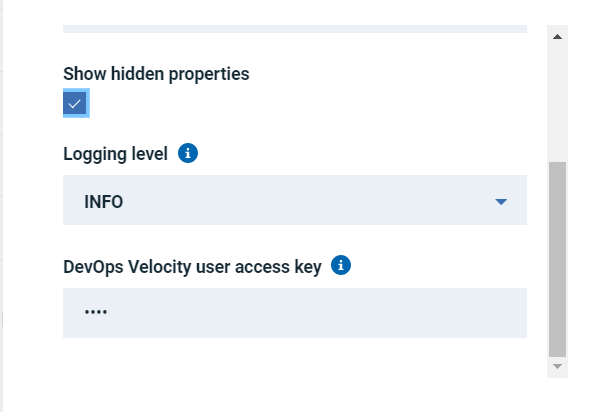Quick Info
Description
ServiceNow supports application delivery by integrating service management processes, social collaboration for IT departments, software-as-a-service delivery, and web functionality. The ServiceNow plugin for HCL DevOps Velocity automates the importing of records for ServiceNow incident management (beta), change management, and problem management from a ServiceNow server.Quick Info
ucv-ext-servicenow:1.1.4.tar
Uploaded: 16-Apr-2024 11:10
Pull Command
docker pull hclcr.io/accelerate/ucv-ext-servicenow:1.1.4ucv-ext-servicenow:1.1.3.tar
Uploaded: 27-Feb-2024 10:51
Pull Command
docker pull hclcr.io/accelerate/ucv-ext-servicenow:1.1.3ucv-ext-servicenow:1.1.2.tar
Uploaded: 02-Feb-2024 11:10
Pull Command
docker pull hclcr.io/accelerate/ucv-ext-servicenow:1.1.2ucv-ext-servicenow:1.1.1.tar
Uploaded: 18-Dec-2023 17:11
Pull Command
docker pull hclcr.io/accelerate/ucv-ext-servicenow:1.1.1Release Notes
ucv-ext-servicenow:1.0.42.tar
Uploaded: 13-Jul-2023 12:13
Pull Command
docker pull hclcr.io/accelerate/ucv-ext-servicenow:1.0.42Release Notes
ucv-ext-servicenow:1.0.36.tar
Uploaded: 26-Aug-2022 08:46
Pull Command
docker pull hclcr.io/accelerate/ucv-ext-servicenow:1.0.36Release Notes
ucv-ext-servicenow:1.0.27.tar
Uploaded: 19-Aug-2021 05:28
Pull Command
docker pull hclcr.io/accelerate/ucv-ext-servicenow:1.0.27Release Notes
ucv-ext-servicenow:1.0.25.tar
Uploaded: 01-Jun-2021 07:00
Pull Command
docker pull hclcr.io/accelerate/ucv-ext-servicenow:1.0.25Release Notes
ucv-ext-servicenow:1.0.14.tar
Uploaded: 08-Feb-2021 07:41
Pull Command
docker pull hclcr.io/accelerate/ucv-ext-servicenow:1.0.14Release Notes
Summary
The ServiceNow plugin provides for integration with a ServiceNow server. This plugin imports incident management(Beta), change management and problem management data from a ServiceNow server and provides a single view of ServiceNow incidents, change requests, and problems in an HCL DevOps Velocity value stream map. Data between the ServiceNow server and the HCL DevOps Velocity server is synchronized every five minutes.
The plugin can also be used to automate several ServiceNow tasks, such as create and update a ServiceNow request.
Compatibility
The plugin supports the ServiceNow Madrid, Orlando and Paris release.
History
The following table describes the changes made in each plugin version.
| Version | Description |
|---|---|
| 1.0.27 | Adding Automation Functionality |
| 1.0.25 | Minor Bug Fixes |
| 1.0.14 | Added HTTP proxy support |
| 1.0.13 | Bug fixes |
Usage
To use the ServiceNow plugin, the plugin must be loaded and an instance created before you can configure the plugin integration and use plugin automation tasks. You define configuration properties in the user interface or in a JSON file.
See the Automation Tasks tab for information on using automation tasks.
Integration type
The ServiceNow plugin supports scheduled events integration which are listed in the following table.
| Name | Description |
|---|---|
| Sync ServiceNow Incident | Queries the ServiceNow repository for Incidents. First execution will pull 6 months of history and the subsequent will pull only changed or updated incidents |
| Sync ServiceNow Change Request | Queries the ServiceNow repository for Change request. First execution will pull 6 months of history and the subsequent will pull only changed or updated change requests |
| Sync ServiceNow Problem | Queries the ServiceNow repository for Problems. First execution will pull 6 months of history and the subsequent will pull only changed or updated problems |
| ServiceNowWaitRequests | Checking all release Event task waiting field status |
| ServiceNowWaitChangeTask | Checking all release Event task waiting field status |
Integration
There are two methods to integrate the plugin:
- Using the user interface
- Using a JSON file
Using the user interface
The tables in the Configuration properties topic describe the properties used to define the integration.
To install the plug-in, perform the following steps:
- In Velocity, click Settings > Integrations > Available.
- In the Action column for the ServiceNow plug-in, click Install.
To integrate the plug-in, perform the following steps:
- In Velocity, click Settings > Integrations > Installed.
- In the Action column for the ServiceNow plug-in, click Add Integration.
- On the Add Integration page enter values for the fields used to configure the integration and define communication.
- Click Add.
Using a JSON file
The JSON file contains the information for creating a value stream and integrating with the ServiceNow server. The following table describes the information for the creating a HCL DevOps Velocity value stream map.
- From a value stream page, download the value stream map. The value stream map is a JSON file used to define integrations.
- Edit the JSON file to include the plugin configuration properties.
- Save and upload the JSON file. This replaces the current JSON file with the new content.
- View the new integration on the Integrations page.
Configuration Properties
The following tables describe the properties used to configure the integration. Each table contains the field name when using the user interface and the property name when using a JSON file.
- The General Configuration Properties table describes configuration properties used by all plugin integrations.
- The ServiceNow Configuration Properties table describes the ServiceNow configuration properties that define the connection and communications with the ServiceNow server. When using the JSON method to integrate the plugin these properties are coded within the
propertiesconfiguration property.
Some properties might not be displayed in the user interface, to see all properties enable the Show Hidden Properties field.

| Name | Description | Required | Property Name |
|---|---|---|---|
| NA | The version of the plugin that you want to use. To view available versions, click the Version History tab. If a value is not specified, the latest version is used. | No | image |
| Integration Name | An assigned name to the value stream. | Yes | name |
| Logging Level | The level of Log4j messages to display in the log file. Valid values are: all, debug, info, warn, error, fatal, off, and trace. | No | loggingLevel |
| NA | List of configuration properties used to connect and communicate with ServiceNow server. Enclose the properties within braces. | Yes | properties |
| The name of the tenant. | Yes | tenant_id | |
| NA | Unique identifier assigned to the plugin. The value for the ServiceNow Server plugin is ucv-ext-servicenow |
Yes | type |
| Name | Type | Description | Required | Property Name |
|---|---|---|---|---|
| Access Token | Secure | The access token used to authenticate with the ServiceNow server. You can use either this property or the Password property to authenticate with the server. | No | accessToken |
| Password | Secure | The password used to authenticate with the ServiceNow server. You can use either this property or the Access Token property to authenticate with the server. | No | password |
| HCL DevOps Velocity User Access Key | Secure | An auto-generated user access key provides credentials for communicating with the HCL DevOps Velocity server. | Yes | NA |
| URL | String | The URL of the ServiceNow server. | Yes | baseUrl |
| User Name | String | The user name used to authenticate with the ServiceNow server. | Yes | username |
| Proxy Server | String | The URL of the proxy server including the port number. | No | proxyServer |
| Proxy User Name | String | The user name used to authenticate with the proxy server. | No | proxyUsername |
| Proxy Password | String | The password used to authenticate with the proxy server. | No | proxyPassword |
| Page Size | Number | The number of issues retrieved per page | false | pageSize |
JSON code sample
The following sample code can be used as a template to define the integration within the JSON file for a value stream. Copy and paste the template into the JSON file Integration section and make the appropriate changes.
integrations": [
{
"type": "ucv-ext-servicenow",
"name": "Plugin for ServiceNow",
"tenant_id": "tenant_id",
"logginglevel": "info",
"properties": {
"ucvAccessKey": "urbancodevelocity_user_accesskey",
"baseUrl": "url_servicenow_server",
"username": "user_name",
"password": "pass_word",
"proxyServer": "proxy_server_url",
"proxyUsername": "proxy_server_user_name",
"proxyPassword": "proxy_server_password"
}
}
]
Automation Tasks
The following automation tasks are available in the ServiceNow plugin:
- ServiceNow – Create Change Request and Change Task
- ServiceNow – Update Change Request and Change Task
- ServiceNow – Wait Change Request
- ServiceNow – Wait Change Task
ServiceNow – Create Change Request and Change Task
Use this step to create a ServiceNow change request and change task.
| Name | Description | Required |
|---|---|---|
| Short Description | A short description of the ServiceNow change request. | Yes |
| Request type | The type of request type for the ServiceNow application. For example: Standard, Normal, and Emergency. | Yes |
| Assignment group | The assignment group for the ServiceNow application. | Yes |
| Additional properties | A list of additional properties for the change request in the format for each list item is {“property”:”value”}. For example: {“short_description”:”Created by HCL DevOps Velocity”}. Separate each list item with a comma (,). See the ServiceNow API documentation for additional properties. | No |
| Create change task | To create change task , provide necessary properties. Example:[{“short_description”:”createtask”,”change_task_type”:”planning”,”description”:”changetask”,”start_date”:”2024-01-30 08:05:04″,”end_date”:”2024-01-31 08:05:13″,”outputProperty”:”example”}]. Here outputProperty holds sys_id of change task created. To create multiple change task provide comma separated objects. Example: [{},{},{}]. To create under existing change request mention “parent”:”CHG0030008″,”change_request”:”CHG0030008″ along with other properties. |
No |
| Output property | The name of the property that the sys_id of the created change request is saved. | No |
ServiceNow – Update Change Request and Change Task
Use this step to update a ServiceNow change request in HCL DevOps Velocity.
| Name | Description | Required |
|---|---|---|
| Change Request Number | Enter the change request number. Note: Either change request number or property reference must be provided |
No |
| Change request system id from property reference. | Enter the property reference to system id. Note: Either change request number or property reference must be provided |
No |
| Change request properties | Enter properties for the change request to be updated in the format for each list item is {“property”:”value”}. For example: {“short_description”:”change request description”,”planned_end_date”:”2024-01-31 07:52:53″,”planned_start_date”:”2024-01-30 07:52:47″}. Separate each list item with a comma (,). See the ServiceNow API documentation for additional properties. | No |
| Update change task | To update change task , provide necessary properties. to create change task Example:[{“sys_id”:”abcd123″,”change_task_type”:”planning”,”state”:”1″}]. property reference can be given to sys_id Example:[{“sys_id”:”${example}”,”change_task_type”:”planning”,”state”:”1″}] to update change task Example:[{“short_description”:”createtask”,”change_task_type”:”planning”,”description”:”changetask”,”start_date”:”2024-01-30 08:05:04″,”end_date”:”2024-01-31 08:05:13″,”outputProperty”:”example”}] To update multiple change task provide comma separated objects. Example: [{},{},{}] |
No |
ServiceNow – Wait Change Request
Use this task to wait ServiceNow change request in HCL DevOps Velocity.
| Name | Description | Required |
|---|---|---|
| Change Request Number | Enter the change request number. Note: Either change request number or property reference must be provided |
No |
| Change request system id from property reference. | Enter the property reference to system id. Note: Either change request number or property reference must be provided |
No |
| Field | The change request field to wait for a match. | Yes |
| Value | The value to match with the change request field. | Yes |
ServiceNow – Wait Change Task
Use this step to create a ServiceNow wait change task.
| Name | Description | Required |
|---|---|---|
| Change task system id from property reference. | Enter the property reference to system id. | Yes |
| Change Request Number | Enter the change request number. Note: Either change request number or property reference must be provided |
No |
| Change request system id from property reference. | Enter the property reference to system id. Note: Either change request number or property reference must be provided |
No |
| field | Enter the change task field to wait for a match | Yes |
| Value | Enter the value to match the change task field | Yes |
Adding automation tasks to a release
After the plugin is integrated automated tasks are available to add as a task within a release.
- Verify that the ServiceNow server is connected to HCL DevOps Velocity.
- On the Create Task page, select the automation task from the Type field drop-down list.
- Complete the properties required for the task.
- Click Save.
Examples
Example using the access key
integrations": [
{
"type": "ucv-ext-servicenow",
"name": "Plugin for ServiceNow",
"tenant_id": "tenant_id",
"logginglevel": "info",
"properties": {
"ucvAccessKey": "urbancodevelocity_user_accesskey",
"baseUrl": "url_servicenow_server",
"username": "user_name",
"accessToken": "access_token",
"proxyServer": "proxy_server_url",
"proxyUsername": "proxy_server_user_name",
"proxyPassword": "proxy_server_password"
}
}
]
 Configuration Properties
Configuration Properties Automation Tasks
Automation Tasks Examples
Examples
